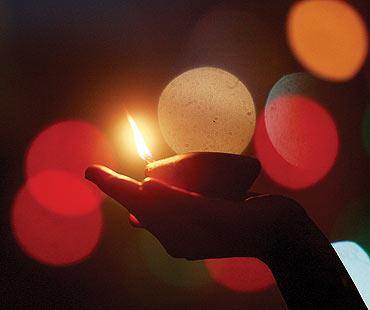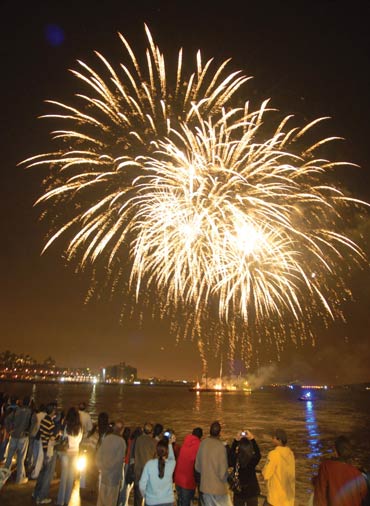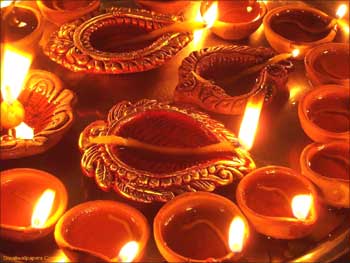Photographs: Athar Hussain / Reuters Murali Kamma
Murali Kamma misses receiving Diwali cards.
Prime Minister Indira Gandhi, after staging a remarkable political comeback, was still alive as was her dream of a socialist India, where 'license' and 'permit' had an ironic connotation, reminding one of limitations rather than liberties. I grew up in that License-Permit-Quota Raj. The 'phoren' craze was alive, too, and before the era of liberalisation, privatisation and globalisation came to India, no country loomed larger in the imagination of middle-class youngsters than what some of us called the You-Yes-Yay.
Despite our fascination with America, we knew little about Valentine's Day, Thanksgiving Day, St Patrick's Day, Mother's Day, Father's Day, Grandparents' Day, Secretary's Day, Pet's Day. Okay, I admit, the last one is a mystery even in this country. But my point is that we would have been astonished to learn that one could buy Hallmark cards in the US for so many special occasions. What we did know about were Diwali cards, which often doubled as Happy New Year greetings. In fact, among my friends and relatives, they were more popular than birthday cards.
Every year, punctually, those colourful Diwali cards with our personal salutations supplementing the canned homilies departed and arrived in the mail, creating the right, bright mood for the festive season, whose much-anticipated climax involved lighting our carefully assembled collections of firecrackers. The new clothes and lamps and sweet treats were nice, no doubt. But nothing could match this spectacular finale.
It's been ages since I sent Diwali cards or lit lamps or wore new clothes on that occasion. Yes, I've handled firecrackers in this country, but that was only on the Fourth of July and New Year's Eve.
I asked a former classmate, with whom I happened to hook up after a long gap, whether he still mailed Diwali cards to his kith and kin. "No," he responded from India. "We celebrate Diwali, of course, but I stopped posting cards."
Although not surprised, I felt a twinge of disappointment, strangely enough. I think it's because he had an artistic touch and used to send beautifully embellished Diwali cards, which I would save along with the other cards we received.
My friend, too, had a question. "Do you celebrate Diwali in America?" he asked.
"Sort of, it's a low-key celebration," I said. "But it's a big deal for many Indians here."
Murali Kamma is an Atlanta-based writer and editor. His fiction has appeared in AIM: America's Intercultural Magazine, South Asian Review and Asian Pacific American Journal, among other publications.
'People in America don't like talking much'
Photographs: Paresh Gandhi
This exchange took place last year, not long after we reconnected. Looking back, I can see why I made the second comment. It's because America Then, as we saw it, was quite different from America Now. And I wanted to make that distinction clear. When we were kids in India, America's allure was undeniable, but it also had an aura of uncertainty that stirred anxiety. Sure, Indians including a few of my relatives had already moved to the States in droves, though the overall population of Indian Americans (as we say now) was still small. Yet in those pre-satellite television, pre-Internet, pre-cell phone days, Indians in America seemed like grains of brown rice accidentally mixed up in a bag of white rice.
Notwithstanding the glowing reports from the land of milk and honey, to stay with the food metaphors, we did have reservations about America. In our circle, there was one story that had a special resonance. Supposedly, a US-born Indian boy shrieks in amazement when he sees another Indian boy for the first time in his white-bread American suburb. Until now, apparently, he hadn't known that others like him existed!
That probably apocryphal tale sounds silly in multicultural America. The Indian-American population has exploded and is now the third largest immigrant community in this country. It was the fourth largest just two years ago, but after surpassing the share of Chinese residents, Indians are numerically behind only two immigrant groups: Mexicans and Filipinos. Also, according to the Migration Information Source, over 40 per cent of foreign-born Indians came to the US in 2000 or later. Not surprisingly, some Indians are concerned that it has become too easy to self-segregate even when you live far from traditional ethnic enclaves like New York's Jackson Heights and New Jersey's Edison.
However, if America is no longer monocultural, and Diwali has even made it to the White House (in a symbolic sense), would my friend react the way another visitor did when he went to Atlanta's Global Mall? "Wow, it's like being in India!" he'd said.
As it turned out, about a month before Diwali last year, when my friend finally made a trip to the US, he didn't see the Global Mall. But he did make an interesting remark on his brief stop in Atlanta. "People in America, it seems to me, don't like talking much," he said, as we got out of my car. A strange observation, I thought, turning to look at him and sure enough, he was grinning. What prompted it, though? If anything, I saw the people here as outgoing and, more often than not, approachable and chatty.
Then I understood. We'd just returned from one of my typical shopping expeditions. The first stop was a Kroger supermarket, where we used the self-service checkout. Ditto at a Wal-Mart superstore, where he wanted to buy some things. Also, as we were exiting, I rented a new DVD by punching some buttons at a Redbox kiosk. We then went to a drive-through ATM, not to mention a drive-through car wash at a gas station, where I also filled up at a self-service pump using my debit card. Oh yes, we did go to a Starbucks, where I actually had to speak to somebody for our order of Chai Lattes but the odd thing about this stop was that the customers inside were islands unto themselves, silently tapping away on their laptops, as they sipped beverages or listened to their iPods.
'Our neighbours are friendly, but we don't want to alarm them'
Photographs: Rediff Archives
No wonder he'd made that comment. My placid life in an American subdivision where, apart from the joggers and walkers, the only people you see are the ones whizzing by in their cars couldn't be more removed from his fast-paced existence in a teeming Indian metro. My friend found the suburban silence eerie, and I sensed his relief when we went to places where there were lots of people. So I could see why he was eager to complete his US trip and go back to India in time for the Diwali celebrations.
Although I had also experienced that life, which has its pluses, I now relish my privacy and have gotten used to the so-called blandness of American suburbia. What about his other point, though? Technology seems to be making human speech and interaction unnecessary or, as teenagers would say, "Texting is in, talking out." In this you-tube, you're-always-on virtual world, where non-stop facebooking and tweeting are de rigueur, is there a danger of "amusing ourselves to death", to borrow the title of a seminal book?
Having said that, I should add that we're no grumpy technophobes itching to return to the old days. My friend and I may be digital immigrants, but like digital natives, we embrace the Internet. How else do you think we found each other after all these years?
This year in our household, the American Diwali celebration will include fireworks, and in keeping with my "sort of" tradition, our son's arsenal will only have sparklers, fountains and spinners. We'll save the other kind for later. Our neighbours are friendly, but we don't want to alarm them with loud explosions and elaborate pyrotechnics!
And speaking of my friend, maybe I'll be inspired to revive another cherished annual ritual: the Diwali card. These days, given the prevalence of e-greetings, sending one has become so much easier. In the meantime, let me start with texting.
:-) Diwali 2 U!




Comment
article